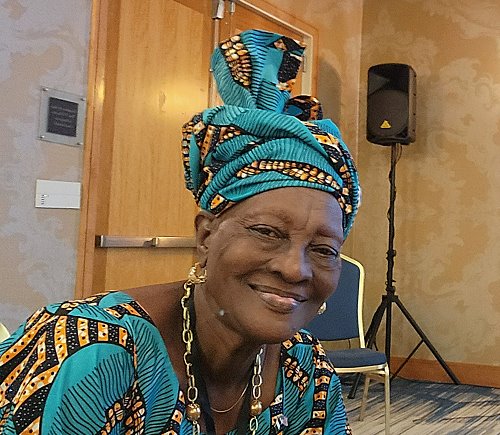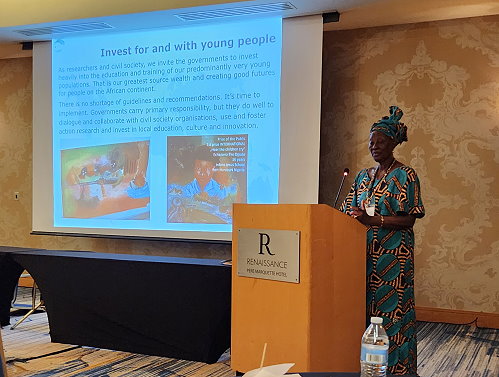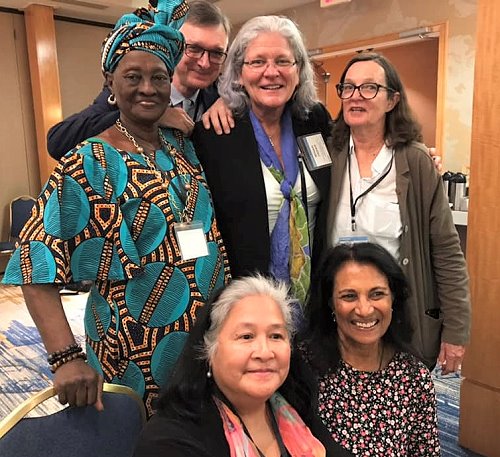 The ‘Feed the Future – Innovation Lab for Fish’ is a USAID supported project based at the Mississippi State University in Starkville, Mississippi. It had invited Stella Williams of Mundus maris as a keynote speaker on 27 February 2023 at day one of its last annual project meeting in New Orleans. Fittingly, the day’s key programme topics were gender, youth, and advancing human and institutional capacity development.
The ‘Feed the Future – Innovation Lab for Fish’ is a USAID supported project based at the Mississippi State University in Starkville, Mississippi. It had invited Stella Williams of Mundus maris as a keynote speaker on 27 February 2023 at day one of its last annual project meeting in New Orleans. Fittingly, the day’s key programme topics were gender, youth, and advancing human and institutional capacity development.
Stella titled her keynote address ‘Action research for sustainable fish food security through gender equality and other innovations’. While speaking during lunch she captured the full attention of her audience.
She reminded the meeting participants that the majority of workers in traditional agriculture in Africa are women and that 45 million persons or 40% of those working in small-scale fisheries around the globe are women. They are the corner stones of family food security, family care and getting kids into school.
She continued that yet, women in fisheries and agriculture are still mostly overlooked, ignored, underpaid or entirely unpaid for the work they do despite being often the de facto managers of family businesses, especially if men are migrant workers or much absent at sea.
 Comparatively few women make it into an academic career to excel in different study areas to reach senior positions in academia, government and private sector.
Comparatively few women make it into an academic career to excel in different study areas to reach senior positions in academia, government and private sector.
Women are, however, particularly prominent in civil society organizations, where they drive innovation and work on social justice.
Harking back to her foundational work in Mundus maris Stella insisted particularly on key aspects of human security which are so important not only in her native Nigeria but in the entire Gulf of Guinea countries and beyond. She admonished that when governments issue licences to industrial fleets and more in the name of the ‘Blue Economy’, much of their production is immediately exported with little or no value added in the country. A high level of illegal, unrecorded and unregulated (IUU) fishing is a threat to countries, lost income of people and governments. Local job creation is minimal. The industrial fleets, most with foreign beneficial ownership, compete directly with small-scale fisheries and drive overfishing and declining resources.
As a result, incomes in artisanal fisheries in West Africa have been declining strongly as researchers demonstrated. That in turn leads to weakening social cohesion as documented for Ghana and neighbouring countries. Women, once pillars of fisheries value chains, report loss of status as they no longer have the means to pre-finance fishing trips and can only rarely buy good quality fish for processing and marketing. That also affects their ability to feed the family and keep kids in school.
 She elaborated on several examples of Mundus maris work promoting youth opportunities, ocean literacy and promoting citizen engagement with the ocean.
She elaborated on several examples of Mundus maris work promoting youth opportunities, ocean literacy and promoting citizen engagement with the ocean.
Stella then shared some more of her successful work in capacity strengthening, notably in the framework of NiWARD, Nigerian Women in Agriculture Research and Development. She had founded that initiative back in 2013 with some 60 award fellows, mentors and mentees and has been developing it ever since.
She described how females at the forefront of food security research and innovation pursuing the following objectives and working modes:
- to reduce hunger and poverty in rural farming communities in Nigeria (national) and on the continent of Africa.
- to empower and promote gender inclusive research and activities in all sectors of agriculture and science.
- skills gained by fellows, mentors and mentees of African Women in Agricultural Research and Development (AWARD) are used to propagate scientific research nationally and across the continent.
- transfer of skills to female scientists by a mentoring approach.
- assisting the less privileged and vulnerable/disabled in the society.
- interaction with other organizations in collaboration and/or partnerships on issues of mutual interests inside and outside of Nigeria.
Stella concluded with a short presentation of the Small-Scale Fisheries Academy and its inclusive adult education methods. This is another successful way to enhance the capacities for collective action of social and economic actors instead of suffering increasing marginalisation.
Across all examples, the audience could see concrete action on the interconnected sustainable development goals. See the slides of Stella’s talk here.
The Seafood We Eat activities
- World Food Day 2024, Joint Webinar with Fish Party
- UN Special Rapporteur on the right to food
- EP Hearing on EU Citizen Initiative to stop shark finning
- Keynote at the ‘Feed the Future – Innovation Lab for Fish’
- FAO webinar ‘Small, low-cost fish: from bait to plate’, 15-16/02/2021
- Enjoy delicious and sustainable seafood with Mundus maris workshops
- Chiloé, or: The disasters of Salmonopoly
- Seafood Symposium – From Fisheries to Foodies, 27 April 2015
- Baltic students concerned about sustainable foods, Rogow, Poland, 15-19 April 2015
- From plates to fuel – the controversial seaweed boom in Chile
- Khazan – Traditional coastal zone management in Goa, India
- Environmentally conscious consumer behaviour in food – what can I do?
- Save baby fish or Point ‘n’ kill?
- “Inseparable” – Fish sustainability campaign celebrates event in Athens
- Respect for minimum fish size. What do Senegalese fish mongers have to say?
- The Mundus maris campaign in the urban markets in Dakar
- Let’s save the Oceans! – Cercle Europa invites
- International Study Group Brussels: Save the Seas!
- Mercado San Miguel in Central Madrid
